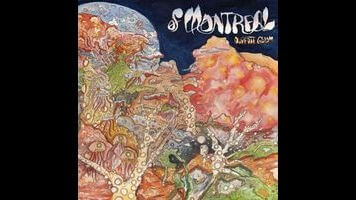Of Montreal channels ’70s New York, stays weird on Aureate Gloom

Of Montreal albums are as much mood pieces as they are music, aural reflections of whatever lightning bolt is currently coursing through Kevin Barnes, the outfit’s charismatic overseer and unabashed over-sharer. Aureate Gloom, the band’s 13th LP in 18 years, is no different, with Barnes himself describing the album not by its sound, but by the state he was in when he wrote it: “a golden despondency.” It’s a fitting phrase, not just for this bleak and tumultuous record, but for the band, who has always pocked its sprawling opuses with spears of cynicism and coins of heavenly light.
Here, those pocks take the form of riffs: loud, broad, and heavily distorted. Inspired by ’70s-era New York and treks through Chelsea and SoHo, Barnes channels Pop, Hell, and Byrne across Aureate Gloom’s 10 tracks, which run the gamut from punk, funk, pop, and hardcore. Those who hoped 2013’s sober and pedal-steel-heavy Lousy With Sylvianbriar signaled a return to Of Montreal’s indie-folk roots may be disappointed; “aureate” does mean “highly ornamented,” after all.
It’s a different kind of ornamentation, however. Rather than a symphony’s worth of bells and whistles, Aureate Gloom achieves grandeur by deploying radical shifts in tone and genre, aided in part by Barnes’ breakneck tempo changes. “Estocadas,” for example, beckons with a white-hot riff ripped from Tom Petty before seamlessly segueing into a strain of buzzing strings that summon the rising dread of post-rock pioneers Godspeed You! Black Emperor. And then there’s the abrupt jump from Suicide-like brood on “Empyrean Abattoir” to the bratty “ah-ohs!” of golden era Ramones. Jarring, yes, but such shifts dovetail nicely with the scattershot nature of Barnes’ apocalyptic poetry, which seems to oscillate swiftly between any number of jilted friends and lovers, sometimes line by line.
Elsewhere, Barnes adopts a more straightforward approach. “Virgilian Lots” opens with a positively scorching storm of escalating guitars that carries through to the bitter end. “Apollyon Of Blue Room,” on the other hand, is so consciously indebted to The Kinks that it makes Of Montreal not sound like Of Montreal; a Herculean feat, by any measure.
But it’s lead single “Bassem Sabry” that feels most out of place here. Though it opens on a tidal wave of distortion, the song soon settles into the kind of funky wah-wah that defined 2010’s kaleidoscopic False Priest. Also, its straightforward, anti-authoritarian lyrics feel at odds with a songsmith whose words thrive on abstractness. Still, you can’t argue with him when he asserts he’s “never followed no kind of master’s voice”: For 18 years, the journeyman artist has marched proudly, and often alone, to the racket clattering in his head. Loud, fickle, and impolite, Aureate Gloom is yet another entry into the evolution of one man’s soul made manifest through music.